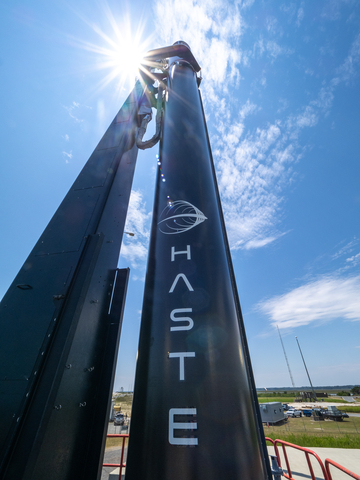Rocket Lab Adds New HASTE Launch from Virginia for the Department of Defense’s Defense Innovation Unit
This latest dedicated HASTE contract is the seventh mission to be added this year to Rocket Lab’s suborbital launch manifest

Rocket Lab's HASTE launch vehicle. Image Credit Austin Adams. (Photo: Business Wire)
The HASTE mission will deploy a suborbital payload by Australian company Hypersonix called DART AE, a scramjet-powered hypersonic vehicle capable of flying non-ballistic flight patterns at speeds of up to Mach 7 (approx. 8,350 kilometres / 5,320 miles per hour). The mission will launch from Rocket Lab’s dedicated launch site at the Virginia Spaceport Authority’s Mid-Atlantic Regional Spaceport on
This latest HASTE mission is the seventh suborbital launch contract awarded to Rocket Lab this year, including Rocket Lab’s first HASTE mission launched on 17 June 2023 for Leidos under the Multi-Service Advanced Capability Hypersonic Test Bed (MACH-TB) program. Leidos has since signed on for four more HASTE missions to launch in 2024 and 2025. Another HASTE launch contract was also announced in August 2023 for a confidential customer.
The mission will be operated by Rocket Lab National Security (RLNS), the Company’s wholly owned subsidiary created to serve the unique needs of the
Rocket Lab’s HASTE suborbital launch vehicle is derived from the Company’s Electron rocket but has been modified to support hypersonic payload deployment. By leveraging the heritage of Rocket Lab’s low-cost Electron – the world’s most frequently launched commercial small launch vehicle – HASTE offers true commercial testing capability at a fraction of the cost of current full-scale tests.
+ About Rocket Lab
Founded in 2006, Rocket Lab is an end-to-end space company with an established track record of mission success. We deliver reliable launch services, satellite manufacture, spacecraft components, and on-orbit management solutions that make it faster, easier and more affordable to access space. Headquartered in
+ FORWARD LOOKING STATEMENTS
This press release contains forward-looking statements within the meaning of the Private Securities Litigation Reform Act of 1995. We intend such forward-looking statements to be covered by the safe harbor provisions for forward looking statements contained in Section 27A of the Securities Act of 1933, as amended (the “Securities Act”) and Section 21E of the Securities Exchange Act of 1934, as amended (the “Exchange Act”). All statements contained in this press release other than statements of historical fact, including, without limitation, statements regarding our launch and space systems operation, launch schedule and window, safe and repeatable access to space, Neutron development, operational expansion and business strategy are forward-looking statements. All statements contained in this press release other than statements of historical fact, including, without limitation, statements regarding our launch and space systems operation, launch schedule and window, safe and repeatable access to space, Neutron development, operational expansion, business strategy, and expectations relating to our financial condition, results of operations, plans, objectives and future performance are forward-looking statements. The words “believe,” “may,” “will,” “estimate,” “potential,” “continue,” “anticipate,” “intend,” “expect,” “strategy,” “future,” “could,” “would,” “project,” “plan,” “target,” and similar expressions are intended to identify forward-looking statements, though not all forward-looking statements use these words or expressions. These statements are neither promises nor guarantees, but involve known and unknown risks, uncertainties and other important factors that may cause our actual results, performance or achievements to be materially different from any future results, performance or achievements expressed or implied by the forward-looking statements, including but not limited to the factors, risks and uncertainties included in our Annual Report on Form 10-K for the fiscal year ended December 31, 2022, as such factors may be updated from time to time in our other filings with the Securities and Exchange Commission (the “SEC”), accessible on the SEC’s website at www.sec.gov and the Investor Relations section of our website at www.rocketlabusa.com, which could cause our actual results to differ materially from those indicated by the forward-looking statements made in this press release. Any such forward-looking statements represent management’s estimates as of the date of this press release. While we may elect to update such forward-looking statements at some point in the future, we disclaim any obligation to do so, even if subsequent events cause our views to change.
View source version on businesswire.com: https://www.businesswire.com/news/home/20231108422546/en/
+ Rocket Lab Media Contact
Murielle Baker
media@rocketlabusa.com
Source: Rocket Lab USA, Inc.








